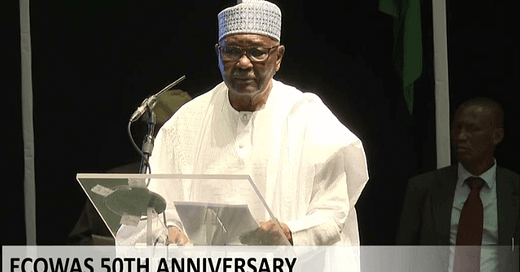Gowon, last living ECOWAS founder, reflects as bloc turns 50
Faith Omoboye
On May 28, 1975, a defining moment in West Africa’s history unfolded in Lagos. Heads of state from across the region gathered to sign the Treaty of Lagos, giving birth to the Economic Community of West African States (ECOWAS). The host and chief proponent of this vision was Nigeria’s then Head of state, General Yakubu Gowon.
Fifty years later, as ECOWAS celebrates its golden jubilee, Gowon—now 90 years old—stands as the last living head of state among the treaty’s original signatories. Reflecting on the milestone, he remains both proud of what has been achieved and candid about the work that remains.
A vision born in the aftermath of war
Gowon recalls that the seeds of ECOWAS were sown in the aftermath of Nigeria’s civil war. On a diplomatic tour to thank neighbouring countries for their understanding and support during the conflict, the idea of deeper regional cooperation began to take shape.
“The idea started soon after the civil war,” he said, “when I went on a thank you visit to member states to thank them for their understanding and support. I was also engaged in entering into similar bilateral agreements with each President and Head of State in the region. But with General Gnassingbé Eyadéma of Togo, we further discussed extending the idea beyond the bilateral level to what was happening in other parts of the world—for example, the EEC in Europe, later the EU, and the East African Community.”
Those discussions led to action. Gowon and Eyadéma tasked their respective ministers—Professor Adebayo Adedeji and Dr. Okoi Arikpo from Nigeria, and Mr. Edem Kodjo from Togo, with drafting a framework for a new multilateral community. This working group, in collaboration with their counterparts from other nations, produced a blueprint that would become the Treaty of Lagos.
“Between me and President Eyadéma,” Gowon said, “we were in constant contact with our colleagues—both English- and French-speaking Heads of State—to get their firm commitment. We eventually succeeded in launching the ECOWAS programme on 28 May 1975 in Lagos.”
Shared prosperity and common goals
Gowon emphasised that ECOWAS was never meant to be an elite club of heads of state, but a genuine people-centred community. “The Treaty of Lagos’ primary aim and objective is to promote economic cooperation and integration between and among member states,” he explained. “It was about achieving collective self-sufficiency and improving citizens’ standard of living—creating an ECOWAS of the people, not just its leadership.”
Over the decades, he noted, ECOWAS has made commendable progress. He pointed to the bloc’s peacekeeping roles in Liberia, Sierra Leone, and Guinea-Bissau, as well as economic initiatives that have helped reduce trade barriers and boost intra-regional commerce. “Trade liberalisation policies have promoted economic growth and development,” he said.
Setbacks and withdrawals
Yet Gowon did not shy away from expressing disappointment over recent developments—particularly the withdrawal of three founding member states. “ECOWAS was hopefully looking forward to a trouble-free, peaceful golden jubilee this year,” he said. “Then came the bombshell from the Alliance of Sahel States—Mali, Burkina Faso, and Niger—withdrawing from the Community.”
The decision of these military-led states to exit ECOWAS earlier in 2024 cast a shadow over the jubilee celebrations. “It came as a great concern,” Gowon lamented. “It is sad that the Community is celebrating its jubilee short of the 50 years as a full original membership.”
Nonetheless, he praised ECOWAS for its diplomatic restraint and continued outreach. “Although ECOWAS had to reluctantly let them go as they decided, it is commendable that the Commission still left the door open and considered giving the group joint partnership status—so that ECOWAS could become ECOWASS: Economic Community of West African States and Sahel. Still maintaining its original name and purpose.”
An enduring hope for unity
While he acknowledged the ongoing challenges—ranging from terrorism and insecurity to what he described as “man’s inhumanity to man”, Gowon insists that the 50-year milestone should be celebrated. “It is 50 years of the majority members of the Community,” he said, “and they should be duly celebrated. Let us say, happy golden jubilee, ECOWAS.”
At 90, Gowon remains a living link to the founding vision of West African cooperation—an ideal tested by time, but not extinguished. As ECOWAS faces one of its most complex periods yet, its last founding father offers both perspective and a call to recommit to the spirit of unity that shaped the Treaty of Lagos in 1975.
BusinessDay NG



